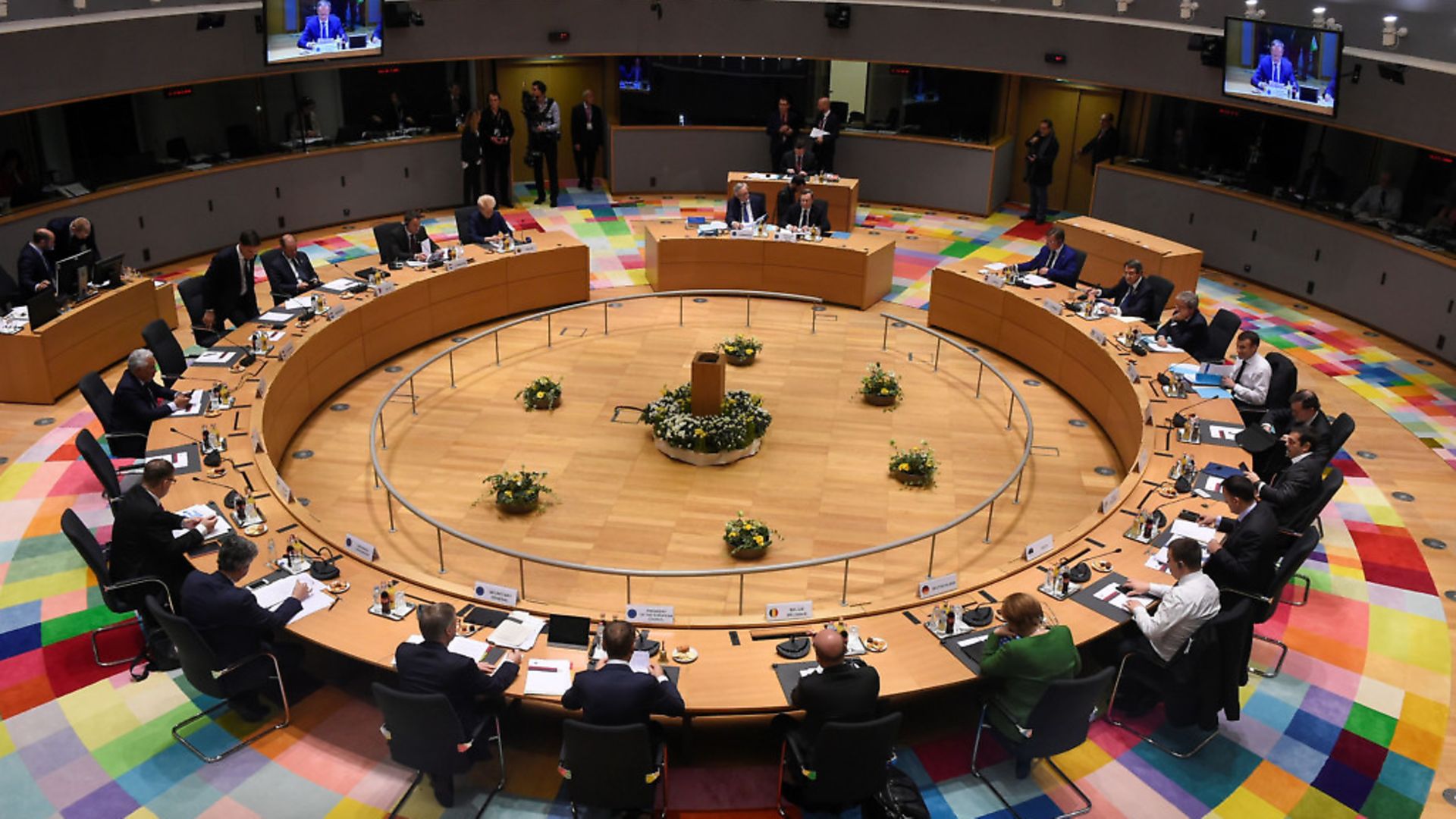
The political and cultural crisis Brexit has unleashed in the UK means the EU is escaping scrutiny of its role in the mess, says JEREMY RICHARDSON
As the Brexit saga grinds on and Britain’s politicians tear into each other over the issue, European leaders look on, exasperated.
In the process thus far, the EU’s representatives have come out of it pretty well, appearing to strike the right tone – determined, magnanimous, united, tough – against their British counterparts, who have often seemed chaotic, self destructive, vacillating and weak.
But does Brussels deserve to occupy the moral high ground? I’m not so sure, and I believe the EU would benefit from more self-examination, and a little less self-satisfaction, as it witnesses the tortuous travails of its breakaway member.
My argument – made as a Remain voter and a supporter of the aims of the EU – is that the Brexit crisis has much to do with how the EU has developed and what it has become, albeit compounded by the recent behaviour of the Brits, especially under an increasingly Trumpian prime minister.
We need to look back in order to understand how the increasing alienation from the EU arose, leading to the populist revolt of Brexit. Is it that voters were ill-informed about the benefits of the EU or is that European elites were the culprits, in that they have spent 60 years building a policy-making state and developing a style of policy-making which has become increasingly coercive over the member states?
The EU’s paradox is that it has achieved so much – from such lofty gains as peace within its borders, to practical day-to-day matters such as cleaner water, better rights for women, and much safer motor vehicles – yet has managed to so alienate many of its citizens (not just the Brits!) that its future is under threat.
The case of motor vehicle safety is an example of the paradox. It is a technical issue yet is also very important for most citizens. Few would dispute the need for some common international standards. The EU, as is often the case, met this need.
Thus, on November 1, 2014 new safety features became mandatory for every new car, van, truck, and bus sold in the EU. Yet those regulations are the exact sort cited by Brexiteers as the ‘shackles’ from which they want to break free with their heroic leap (probably off a cliff).
The EU’s public policy-making has become framed as unjustified interference in national sovereignty. Part of the explanation is that even very technical legislation (such as vehicle safety) is actually coercive. It is not optional.
One irony of Brexit is that a huge proportion of sensible public policy under which British citizens now live emanates from the EU and will likely stay in place long after Britain’s possible exit.
In the event that the UK leaves, some laws will be repealed or significantly amended, but a significant proportion will be unchanged. They were introduced by the EU for good reasons frequently supported and championed by the UK.
The EU has not passed a lot of bad legislation, but it has constructed a system of policy-making which has raced ahead of what European peoples want. It has acquired the power to decide a vast range of public policies affecting its citizens, and the steady transfer of sovereignty means that the EU has begun to look much more like a sovereign state than a collection of sovereign states working together to solve problems.
All of the EU’s institutions have been very adept at task expansion. The remit of the EU’s institutions has expanded inexorably. The natural law of organisational behaviour capture – of a structure incrementally expanding its remit and scope – has been at work, and was a central issue in 2016’s referendum. Leavers were right in arguing the EU had extended its policy remit at the expense of the member states. The supremacy of EU law and the powers of the European Court of Justice (ECJ) are the most visible examples of this.
However, if one institution is to be the focus of anti-EU sentiment, the Commission should take pride of place. It has been the main policy entrepreneur. It is a body of public servants both committed to the European ideal and looking for work.
Similarly, the European parliament, though containing Eurosceptics, has also been a pro-integration legislature looking for work, wanting more integration and more powers for itself.
Even the member states have been active in the tectonic shift of power to the supranational level. The argument that intractable policy problems are best solved at the EU level has generally held sway, notwithstanding opt-outs and multi-speed integration. Even deeply Eurosceptic member states like the UK have agreed to increased Europeanisation and have occasionally been advocates, such the UK’s strong support for the Single European Act, signed in 1986.
Finally, there is the role of interest groups in Europeanisation. A striking aspect of the process has been the development of a dense, EU-level interest group system. Many observers (including me) saw this trend as going a long way to addressing the EU’s democratic deficit.
Many organisations, such as women’s and environmental groups, concluded that they would gain more policy concessions at the European level. What had been denied at the national level was often granted at the EU level.
Similarly, business groups have seen the benefit of working under one set of European regulations, rather than under many different national regulations. It is no accident that most conventional interest groups in Britain were in favour of Remain in 2016. The result has been the emergence of an almost symbiotic relationship between the Commission, particularly, and interest groups.
However, this close integration might have had the perverse effect of distancing the EU from broader public opinion. The shift in focus from the national to the EU level by interest groups might have exacerbated the problem of the democratic deficit. These groups do not equal ‘the public’, as was seen in the UK’s referendum. Moreover, the interest groups could not deliver the votes of their members for the Remain cause.
We have seen the gradual creation of a broadly-based European elite in favour of a continuous process of integration, a Brussels ‘groupthink’, quite detached from ordinary folk in the fish and chip shop queue in, say, Hartlepool. Head in the sand, the Euro-elite created a vacuum at the national level, which new anti-EU parties have filled.
To be fair to the EU institutions, particularly the Commission, they some time ago recognised it was time to ease off on the accelerator, reducing the flow of new legislation and also trying to have better regulation. This recognition was much too late. European elites really had become out of touch with their peoples and were very slow to spot what was going on under their very noses.
The EU’s expansionary trajectory was bound to lead to the EU hitting the buffers, unless one believes notions of national sovereignty were long since dead and buried. National leaders might have subscribed to this view, to at least some degree, but their citizens have not abandoned notions of the independent nation state and national identity, however unrealistic as concepts they might be in a globalised world.
The substance of EU integration has not been the only problem. The EU policy style has to some degree shifted from a consensus-based process of policy formation towards a more coercive, top-down policy style.
European policy formulation is characterised by bargaining and consensus, but there is often a mailed fist within that velvet glove to subsequently enforce that consensus. Once in place, EU law has bite. However ‘good’ EU laws might be, it is Brussels’ bite that has grabbed the attention of voters.
The irony of Brexit is that a different kind of EU might emerge. It is clear that ‘ever closer union’ is going to be a hard sell. The EU needs to become more minimalist and less coercive. If the EU’s institutions make this (big) cultural shift, Britain need not leave the EU after all.
Jeremy Richardson is co-editor (with Berthold Rittberger) of the Journal of European Public Policy, an Emeritus Fellow at Nuffield College, University of Oxford and a professor at the University of Canterbury, New Zealand, in the National Centre for Research on Europe









